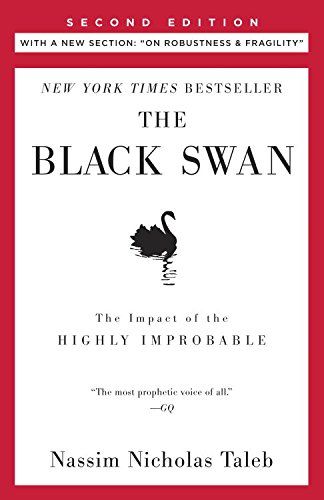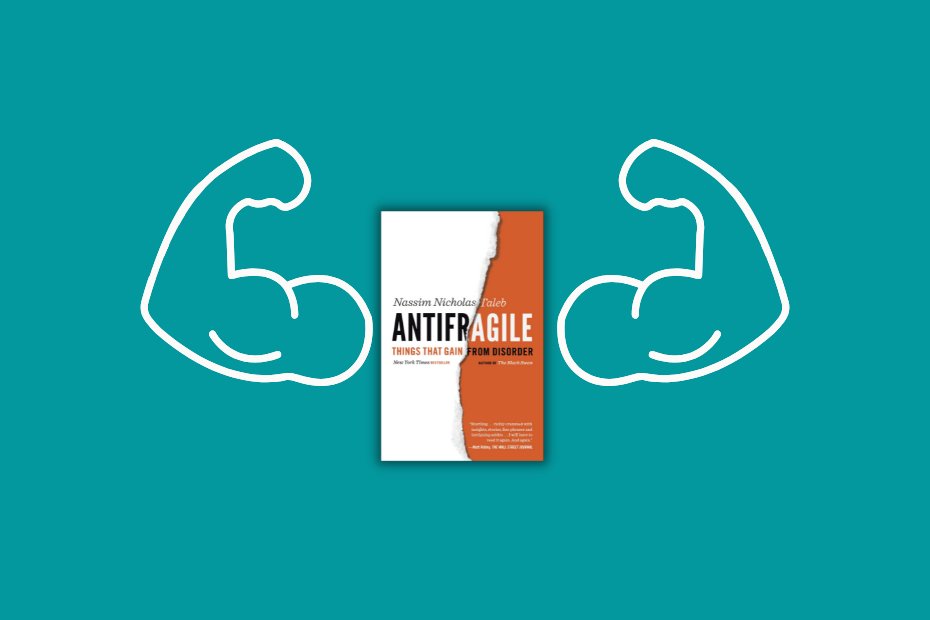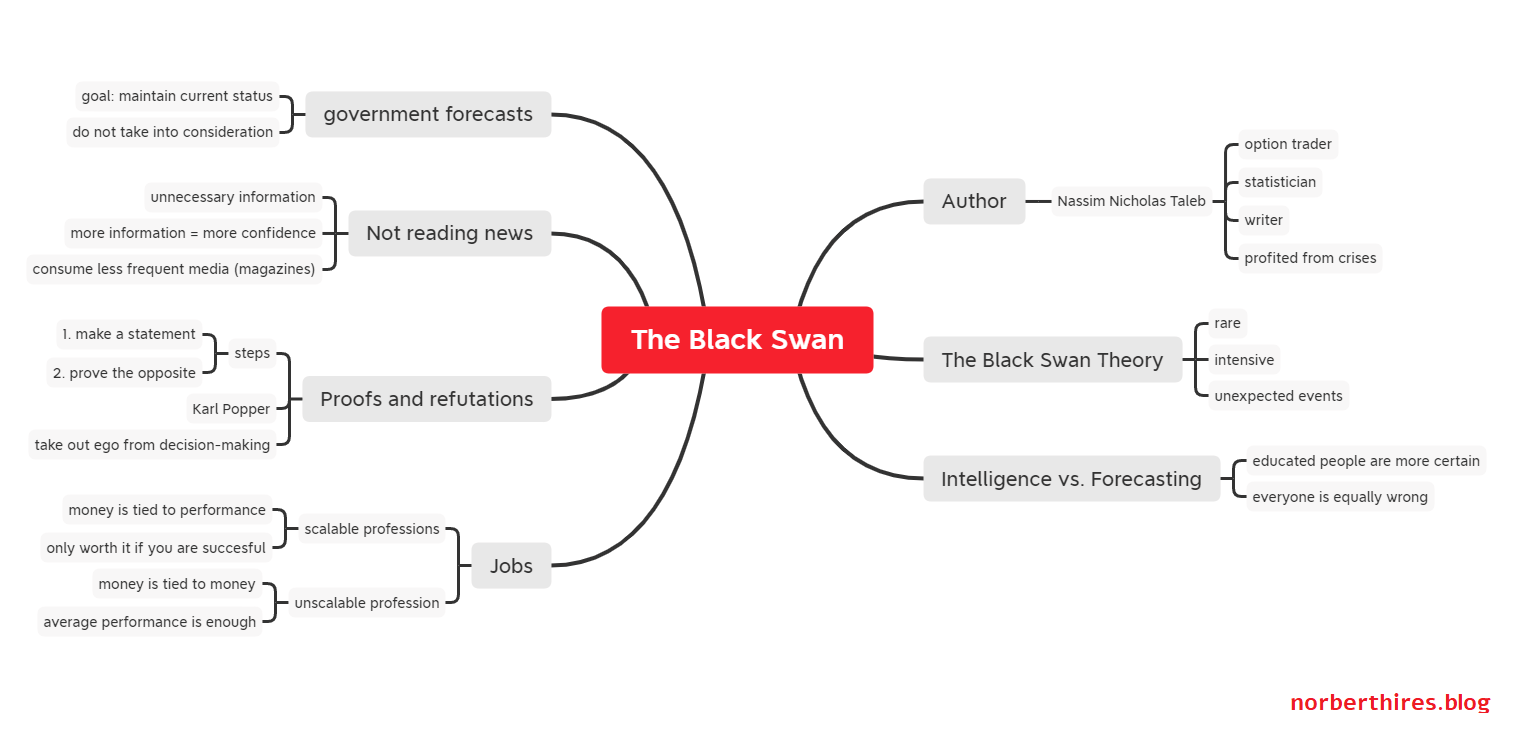The Black Swan by Nassim Taleb: Summary and Learnings

Nassim Nicholas Taleb is an American-Lebanese stock market analyst, option trader, statistician, and writer. His first book (Fooled by Randomness) was published the week before September 11, 2001.
In Fooled by Randomness, Taleb discusses the likelihood of an airplane crashing into an office building, which, in the light of what had happened, could elevate the former Wall Street analyst to prophetic heights. Many asked Taleb how he was able to predict the attack on the Twin Towers.
"I didn't predict, there was just a chance it would happen." - he said.
The internet is full of tips on crises.
Most “experts”, in addition to not having personally experienced a crisis, are unaware of the uniqueness of the current situation. I don’t know almost anything about crises, so I thought it was a good idea to read the book of a man who built his career on unexpected events.
Taleb accumulated a small fortune on the Black Friday of 1987, while others lost millions. The trader also emerged victorious from the 2008 crisis, attributing his results to a phenomenon called the Black Swan.

Comment: Taleb’s personality and work are highly controversial in scientific circles, but his achievements cannot be debated. His book with quotes from all ancient thinkers and long anecdotes is difficult to read, but because of the quality of the ideas discussed, it is worth taking Taleb’s book in hand.
The Black Swan Theory
The Black Swan is a metaphor that describes events that occur unexpectedly, have significant effects, and are often misinterpreted after they occur.
The concept stems from the ancient maxim that black swans do not exist. After seeing the “first” black swan in the wilderness, humanity found a new meaning to the saying.
Taleb describes our relationship to information and mistakes in our decision-making with Black Swan theory.
However, the Black Swan theory cannot be drawn to the current situation, as the coronavirus is not a black swan, as Taleb said in an interview.
The black swan is
- rare,
- intensive,
- and unexpected, beyond our current capabilities
The coronavirus is not a new virus, first identified in the 1930s. So it doesn’t go beyond our current capabilities.
Would it be unexpected?
I would rather leave it to you to decide this issue, but Taleb is quite polite about possible preventive measures.
If the coronavirus is not a Black Swan, then what can we learn from crisis management and decisions making during the crisis?
Intelligent does not mean smarter
As a child, Taleb noticed that very intelligent and well-informed people had no advantage over taxi drivers, for example, when it came to forecasts and predictions.
However, there was a difference.
Taxi drivers didn’t think they understood the subject as much as educated people.
No one knew anything, but the well-educated people believed they knew more just because they were elite thinkers. And if you’re a member of an elite group, you need to know more.
Black Swans and Career Decisions
Black Swans are scalable events. Their financial impact can be increased by several zeros without energy investment.
Translated into individual decisions: if you want a scalable job, choose a position where you are not paid by the hour, so your payment is not limited by the amount of work done.
But be aware of the odds of succeeding in a scalable profession:
"A scalable profession is good only if you are successful; they are more competitive, produce monstrous inequalities, and are far more random with huge disparities between efforts and rewards — a few can take a large share of the pie, leaving others out entirely at no fault of their own.One category of profession is driven by the mediocre, the average, and the middle-of-the-road. In it, the mediocre is collectively consequential. The other has either giants or dwarves — more precisely, a very small number of giants and a huge number of dwarves."
Impact of opinions
According to the narrator’s mistake, we have a limited ability to observe facts without developing explanatory theories, looking for a logical connection between the facts.
Explanations link facts.
Explanations make the facts easier to remember and help to interpret them.
Outplaying our decision-making mistakes (and egos)
The philosopher Karl Popper introduced us to a mechanism called proofs and refutations, which works as follows:
You make a statement and look for observations that prove the opposite.
This is an alternative to our affirmative thinking.
The speculator, George Soros, a former student of Popper, says some are constantly looking for examples that can overturn his original assumption when making investment decisions.
Using evidence and refutations is a real sign of confidence: the ability to assume that you are able or look at the world without looking for ego-enhancing signs.
Why you shouldn't read the news
The news obscures your judgment with unnecessary information.
In one experiment, bookmakers were given ten completely useless numbers and then asked to guess the outcome of the horse race. After that, they were given ten more numbers and could guess again.
More information did not lead to better tips, but confidence in their decisions increased.
More information proved to be harmful.
Train yourself to be able to differentiate between the sensationalist and the empirical. Isolation from the toxicity of the world will benefit not only your thinking but also your well-being.
Reading daily news or listening to the radio has a much worse effect on you than reading a weekly magazine. The less frequently the media is released, the longer the time frame and the better the information is filtered
Taleb and government forecasts
Be careful with government forecasts!
Do not give great importance to these estimates! The goal of civil servants is to maintain survival and the current situation - not to predict the truth.
Taleb’s thoughts are provocative, but they also make us think.
Related Book






